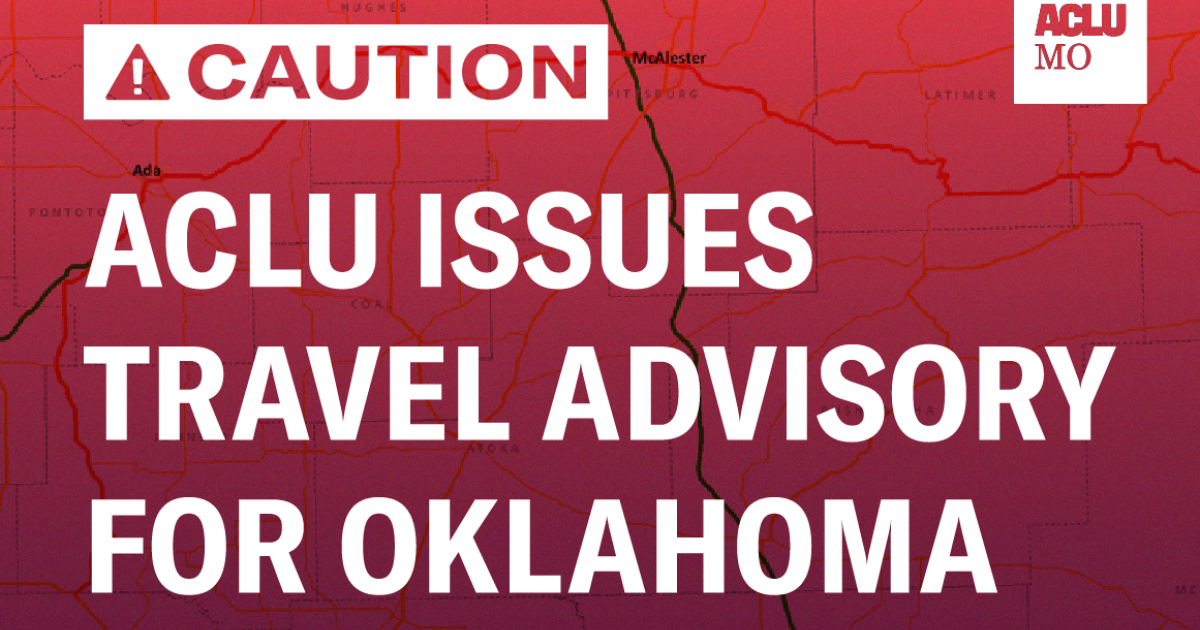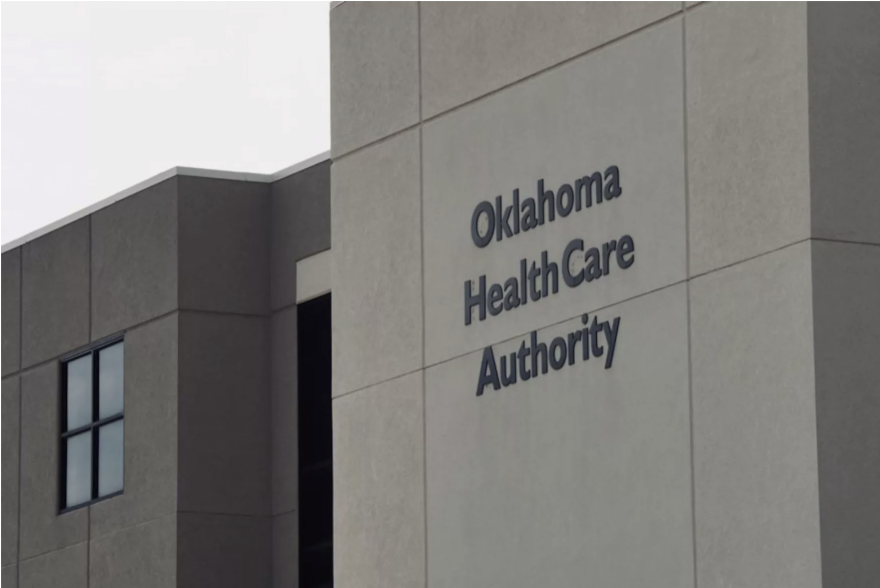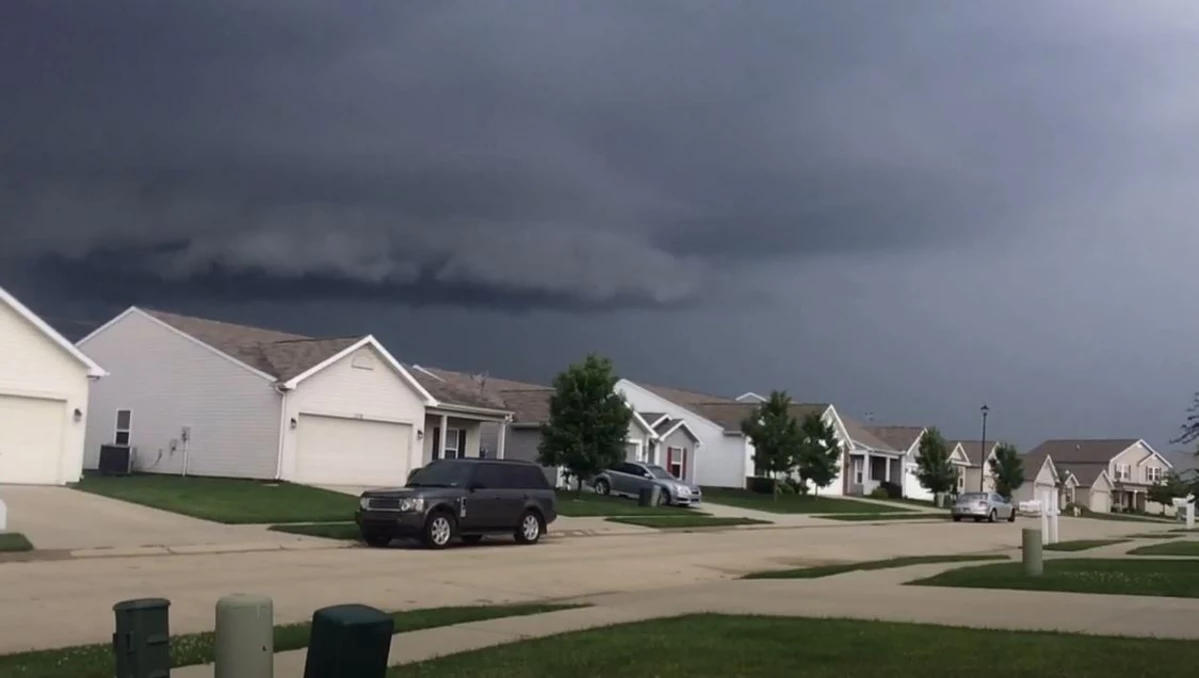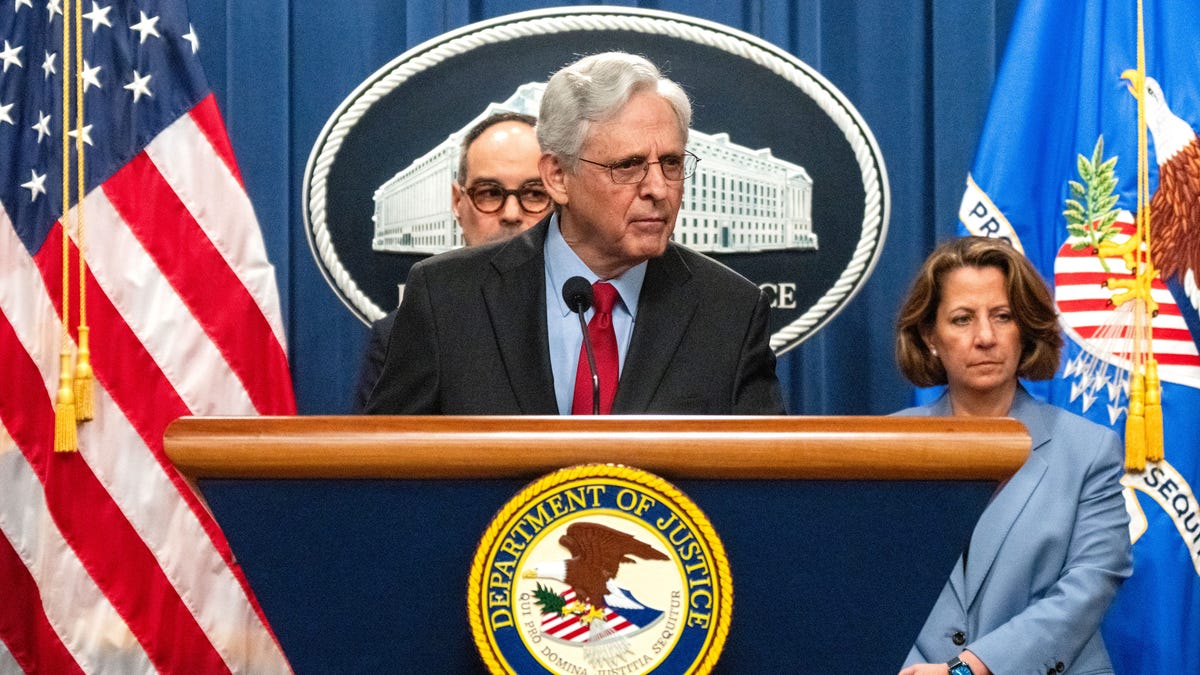Oklahoma
ACLU Issues Travel Advisory for Oklahoma After Passage of Extreme Anti-Immigrant Law

ALBUQUERQUE – The American Civil Liberties Unions (ACLUs) of New Mexico, Oklahoma, Arizona, San Diego and Imperial Counties, Colorado, Missouri, Arkansas and Kansas issued an advisory warning their residents about the threat of civil and constitutional rights violations when traveling in the state of Oklahoma after the passage of an extreme anti-immigrant law.
Oklahoma’s new law, HB 4156, makes entering and remaining in Oklahoma a crime if a person entered the United States unlawfully. It would also make reentering Oklahoma after being ordered removed from the U.S. a crime.
When implemented, this law will pose a risk to any person while in Oklahoma, since travelers and Oklahoma residents, including life-long undocumented Oklahomans or residents of neighboring states, are at risk of arrest and imprisonment. The law also raises the possibility of racial profiling by law enforcement officers who are untrained in complex federal immigration law.
“HB 4156 is an attack on immigrants everywhere. By taking on unconstitutional immigration enforcement power, the government in Oklahoma is threatening immigrants who have lived and worked in their communities for decades. This is also a threat to New Mexicans who are undocumented, have mixed-status families or are simply a target for racist profiling overeager and undertrained local law enforcement officers,” said ACLU of New Mexico Border and Immigration Policy Advocate Leonardo Castañeda. “That is why states surrounding Oklahoma, as well as across the border, are issuing this advisory as both a warning to our residents and in solidarity with Oklahomans who do not want this law and believe in treating immigrants humanely, not as political pawns.”
Countless residents of states bordering Oklahoma have family and loved ones who may be at risk from this law that threatens their civil liberties. This joint travel advisory highlights the solidarity of communities surrounding Oklahoma against punitive and counterproductive policies that harm our immigrant communities and do nothing to welcome people seeking safety and refuge.
People traveling in Oklahoma are advised to remain calm if stopped by police and encouraged to exercise their right to immediately ask for an attorney and otherwise remain silent. More guidance is outlined in the travel advisory found here (link will take you to the ACLU of New Mexico’s website).

Oklahoma
Oklahoma’s transition to managed Medicaid brings new benefits, challenges for providers, patients

Amanda Paul was inspired to become a speech-language pathologist because of her daughter, who experienced language and learning problems as a child. Now, Paul runs her own clinic in downtown Chickasha, where she serves mostly Medicaid families.
She uses shelves filled with toys to connect with kids with autism, Down syndrome and sensory issues, and she teaches them how to communicate. She does all of this while handling the day-to-day operations of her rural, independent practice.
“I do it all. I’m the secretary, the speech path, the janitor. It’s all me,” Paul said.
Paul said her job has become much harder in the past few months as the state transitions to managed Medicaid, or SoonerSelect. In a 10-month turnaround, the Oklahoma Health Care Authority (OHCA) went from paying providers to paying private companies to coordinate Medicaid care.
The state contracted with the medical plans Humana Healthy Horizons, Aetna Better Health and Oklahoma Complete Health, which also runs Oklahoma’s Children Specialty Program. They went live April 1.
A month into the new system, Paul said she only received about 5% of the claims she sent out. She’s had to cancel client visits and spend late nights figuring out why she wasn’t getting paid.
“My blood pressure is normally under control. Last week, it was 191 over 101 because of the stress,” Paul said.
Jillian Taylor
/
StateImpact Oklahoma
But she kept seeing patients. That was the case for multiple providers in mental health and occupational therapy, who told StateImpact they waited weeks to receive only small portions of their payments. They all continued seeing patients for free until they mostly resolved their issues with the plans. Paul said she’s still working on that. Even now, only one plan has given her some checks from May, while the other two have provided about half of them from April.
As of May 13, 616,224 Oklahomans on Medicaid are now seeing their medical care coordinated by private insurance companies instead of OHCA. Proponents say the change incentivizes preventative care and its rollout has been going well. But it has caused problems for some Oklahomans on Medicaid and the smaller providers, like Paul, who are serving them.
What is managed care and how did Oklahoma get it?
OHCA began its transition to SoonerSelect in 2022 after Gov. Kevin Stitt signed Senate Bill 1337 — authored by Sen. Greg McCortney (R-Ada) and Rep. Marcus McEntire (R-Duncan) — and Senate Bill 1396 — authored by McCortney and Rep. Kevin Wallace (R-Wellston).
SB 1337 required OHCA to enter capitated contracts with entities to deliver Medicaid services. It left out the state’s aged, blind and disabled populations, meaning they will still be served under the OHCA-led Medicaid program, SoonerCare.
SB 1396 added to an already existing Supplemental Hospital Offset Payment Program, which taxes hospitals and uses collected fees to attract more federal money. That total is redistributed to participating hospitals. The bill brought an opportunity to invest additional funding into hospitals, and they received an accelerated payment of $252.4 million in April.
Since those bills were signed, OHCA has been working to make providers and members aware of the transition through things like newsletters, social media posts, town halls and provider meetings.
SoonerSelect health plan enrollment began Feb. 1 and ended March 10, and if members didn’t actively choose a plan, OHCA enrolled them in one on their behalf. OHCA’s Public Information Officer Emily Long said at the end of open enrollment, about 20% of Oklahomans had actively chosen a plan.
Oklahoma’s Medicaid Director Traylor Rains said to help the agency maintain its oversight role, OHCA created a 20-person operation division that specifically focuses on SoonerSelect. They also brought on some consultants to help them meet the needs of managed care.
Long said the transition to SoonerSelect allows Oklahoma to achieve goals like improving health outcomes, customer satisfaction and investing in preventative primary care. Each of the plans offers a list of unique benefits, including monetary incentives for attending well-child and primary care visits, making care managers available to members and waiving copays for certain services.

Problems for providers
Rains said the state’s contract requires the insurance companies to pay 90% of all clean claims in 14 calendar days.
“That claim coming into the managed care plan has to have the right provider information on it … and match all the editing criteria,” Rains said.
The operation team receives reports from companies that it will use to verify if plans meet that target. If they don’t, they could face monetary penalties.
The Oklahoma Health Care Authority found challenges early in the transition, including errors in processing claims and issues with direct deposits and call centers. They sought to address those through multi-week office hours with the plans and provider-specific town halls. Plans also offer advance or interim payments to providers experiencing cash flow issues.
StateImpact reached out to Oklahoma’s three medical-managed care plans about the transition. Humana Healthy Horizons interviewed with StateImpact. Aetna Better Health and Oklahoma Complete Health sent statements. Those are included at the end of the article.
Humana Healthy Horizons in Oklahoma CEO Joseph Fairbanks said 99.9% of the plan’s clean claims are being paid out in 14 days, and their average for claims processing is within six days of receipt.
Some of the issues Paul said she struggled with included getting her claims for one plan through the online provider portal, Availity. She also found out later that she had been billing incorrectly for another plan. Those issues took a lot of late nights to solve, and she said she’s still stressing week to week as she waits for more payments to come in. She’s had to consider closing down at points.
Fairbanks said although overall feedback has been positive from providers, certain ones, like Paul, are more likely to have issues.
“By their nature, because they’re either individually run provider clinics or they have a smaller staff, they don’t have as many resources as some of the larger providers did to prepare. So we have to help them substantially more than we do some of the larger providers,” Fairbanks said.
The Oklahoma State Medical Association President Dr. Edgar Boyd said it can be challenging for providers to have to choose between paying their bills and serving their patients. It’s a choice, he said, they don’t want to have to make as the transition continues.
“I don’t want to see patients cut off from access to care, just because their provider can’t afford to float the loan any longer,” Boyd said.
Problems for patients
Boyd, a practicing otolaryngologist in Muskogee, said despite communications from OHCA, he worried his Medicaid patients weren’t prepared.
“I would see patients in my office in early March and ask them if they had selected their new insurance company for their child,” Boyd said. “‘Oh no, we have SoonerCare Medicaid.’ I go ‘Well it’s changing come April 1st.’ ‘Oh, we didn’t know anything about that.’”
Stillwater resident Donna Waldrop said she tried to prepare as much as she could before the transition. Waldrop receives Medicaid as a live-in caregiver for her best friend, and she chose Humana Healthy Horizons because most of her doctors were taking it. But she said she had to change some of her specialists because they didn’t take Humana.
Specialists like her rheumatologist. She said they canceled her appointment the day before in May despite a 90-day continuity of care period required by the Oklahoma Health Care Authority. This means that Oklahomans should be able to see their regular providers through June even if they’re contracted with a different insurance than what they chose.
That meant she had to push back getting surgery for a torn ligament in her hip because she needed the specialist’s approval.
“I am just beside myself because I had all these things planned out, specialists I was supposed to go see in May to try to get my hip done by the summer. Because I am a caregiver. I have to plan this out very carefully. … I probably will have to live with this for at least another year,” Waldrop said.
Waldrop said she will also lose her psychiatrist because the company they work under will no longer take Medicaid after the continuity of care period. A company spokesperson from Lifestance, an online behavioral health company, told StateImpact why in an email:
“We work hard with each insurer to ensure sustainable levels of investment in mental health care. Unfortunately, the significant regulatory burden associated with accepting SoonerCare, combined with reimbursement levels that do not cover the cost of care, made it impossible for us to continue to contract with SoonerCare at the moment. We remain committed to continuing to engage with the state to identify a sustainable path forward for mental health care.”
Waldrop said as of late May, she changed her plan to Oklahoma Complete Health, allowing her to get a delayed appointment in July with her rheumatologist. She said she’s worried about further delaying surgery for both herself and her friend.
“It is eventually going to cause me to not be able to work if it gets worse. … This is the kind of injury that needs surgery to fix. If not, you live with it, and you become more disabled. If this is not fixed, I will need a hip replacement. I’m 45,” Waldrop said.
Positive potential
Although some providers and people say this transition has been difficult, others disagree. Stigler Health and Wellness Center CEO Teresa Huggins said they felt prepared for the transition and supported by the plans.
She looks forward to seeing the impacts this model could have on preventative care through some of its added benefits. Her goal is to use this transition to strengthen the center’s care model.
“We hope that those outcomes will be better quality indicators, better health outcomes for them, and then that would result obviously in less cost to the state,” Huggins said.
Oklahoma’s Medicaid Director Traylor Rains said overall, the Health Care Authority feels this transition has gone as well as the agency could have expected on a short turnaround. Long said Oklahoma has improved from where it was at the beginning of April when the rollout of SoonerSelect launched.
“We are continuing to work with our partners at the plans and providers to resolve any other issues that come up because it’s very important for us for our providers to feel that they are supported and that we can help them in any way that we can,” Long said.
But as the transition continues, providers like Amanda Paul and patients like Donna Waldrop are dealing with the growing pains.
Statements from contracted entities
Aetna Better Health:
Aetna Better Health of Oklahoma is deeply committed to improving health outcomes for SoonerSelect members. We recognize that the state’s transition to managed care is significant and are working closely with our members and the state to ensure coverage is continued and enhanced for all SoonerSelect members both in the short and long term.
-Aetna Executive Director of Communications Alex Kepnes
Oklahoma Complete Health:
Oklahoma Complete Health is excited about the opportunity to deliver innovative solutions to address the drivers of health, remove barriers to care and deliver better health outcomes for Oklahomans.
We believe primary care is the foundation of comprehensive health care. It is imperative that we educate our members about the importance of choosing and working closely with their primary care providers.
To assure continuity of care for members, Oklahoma Complete Health is honoring all OHCA prior authorizations.
If a provider holds a current authorization issued by OHCA, no further prior authorizations requests need to be submitted unless notified by Oklahoma Complete Health.
-Oklahoma Complete Health Chief Medical Officer Dr. Lynn Mitchell
Additional Resources:
- Oklahomans have until the end of June to change their plans. They can call 800-987-7767, option 5 to talk with choice counselors.
- OHCA SoonerSelect Contact: SoonerSelect@okhca.org
- Provider resources are available on OHCA’s website
- Member resources are available on OHCA’s website
StateImpact Oklahoma is a partnership of Oklahoma’s public radio stations which relies on contributions from readers and listeners to fulfill its mission of public service to Oklahoma and beyond. Donate online.
Oklahoma
Lawmakers Make 1st Move Towards Bringing Business Courts To Oklahoma

At the Capitol, the state legislature is making the first move to bring business courts to the state.
Lawmakers say this will help with the backlog in county courts.
Oklahoma will become the 26th state to have business courts.
But this is just the first step – creating a task force to figure out what the court will look like here in the state.
This idea of a business court has been a big push from Governor Stitt – who deemed it one of his four priorities during budget negotiations last week.
He says this will help clear some backlog in county courts having a specific area to settle business disputes and commercial litigations between businesses.
With this being a new idea in the state, the actual legislation would create an 11-person task force to figure out exactly how to implement a business court. Then it would green-light the courts in Tulsa and Oklahoma County in 2026.
“The need that it would provide would come out of the task force meetings they are very there’s a clear direction in this bill for them to come up with that plan but when you have contractual disputes many states have found wisdom in creating these courts,” said Senate Pro Tem Greg Treat (R-Oklahoma City).
The bill passed out of the senate with only four no votes, it will now move to the state house for consideration.
Oklahoma
Josh Heupel describes emotions of returning to Oklahoma in 2024

Josh Heupel is going to have quite the trip back to Oklahoma now that the Sooners are in the SEC.
Not only is Heupel a legend as a Sooner, he coached with them in 2004 as a GA and eventually as an assistant and offensive coordinator from 2006-14. With the Sooners now in the SEC and Tennessee looming on the schedule, Heupel will have all the feelings come back.
Oklahoma and Heupel pretty much go hand in hand, except when Tennessee has to play the Sooners.
“You know, for me, from my coaching career to playing career, you know a lot of great relationships, a lot of great memories,” Heupel said at the SEC Meetings.
“So many people that have been a huge part of helping me as a player, grow as man, helped me in this profession as well. So a lot of great memories, a lot of people that I still stay in touch with. Sister lives back there, dad lives back there as well. So it will be unique d to go back and play inside of that stadium, being on the other sideline.”
Tennessee hits the road to Norman, Oklahoma on September 21st as the Volunteers’ SEC opener. It’ll be quite the show.
There’s going to be a very high ceiling on the Tennessee Volunteers this season, with Andy Staples arguing that he thinks the Volunteers could make their first trip to the College Football Playoff in 2024. That’s in no small part due to a relatively manageable schedule compared to their peers. This is a big opportunity for Heupel.
“Very intriguing team,” Andy Staples said. “Tennessee is one of these. Ole Miss is one of these. I explain to people, as divisions go away in these various leagues, like the Big Ten and the SEC, schedule draw means a lot. Tennessee’s schedule draw is not Georgia‘s schedule draw, it’s not Florida‘s schedule draw. It is much closer to Ole Miss’ schedule draw. Therefore, I am making Tennessee’s ceiling a Playoff berth.”
Ultimately, Cody Bellaire agreed that a potential Playoff run is on the table for Tennessee. That’s largely because of what Nico Iamaleava and the rest of the offense is capable of doing in 2024.
“Yes, and you know what helps a Playoff run,” Bellaire said. “Having a generational quarterback. Nico Iamaleava has a chance to bring Tennessee back into the Playoff conversation and light up the scoreboard like we saw when Hendon Hooker was taking snaps for the Vols.
“He was the number one player in the country for On3 for a reason. He has elite arm talent. He’s a dynamic athlete. He’s got all the tools that Josh Heupel is looking for at the quarterback position.”
Seems like Heupel has the tools to get this team to the promised land. Maybe Oklahoma could spoil the party as well.
-

 Culture1 week ago
Culture1 week agoFrom Dairy Daddies to Trash Pandas: How branding creates fans for lower-league baseball teams
-

 World1 week ago
World1 week agoPanic in Bishkek: Why were Pakistani students attacked in Kyrgyzstan?
-

 News1 week ago
News1 week agoRed Lobster files for bankruptcy after missteps including all-you-can-eat shrimp
-

 News1 week ago
News1 week agoThe states where abortion is on the ballot in November : Consider This from NPR
-

 Politics1 week ago
Politics1 week agoMichael Cohen swore he had nothing derogatory on Trump, his ex-lawyer says – another lie – as testimony ends
-

 Movie Reviews1 week ago
Movie Reviews1 week agoMai Movie Review: Emotionally powerful lead performances in this sensitive and heart-breaking romantic film
-

 Politics1 week ago
Politics1 week agoAnti-Israel agitators interrupt Blinken Senate testimony, hauled out by Capitol police
-

 News1 week ago
News1 week agoCity of Kyle falls short of ‘Kyle’ world record














